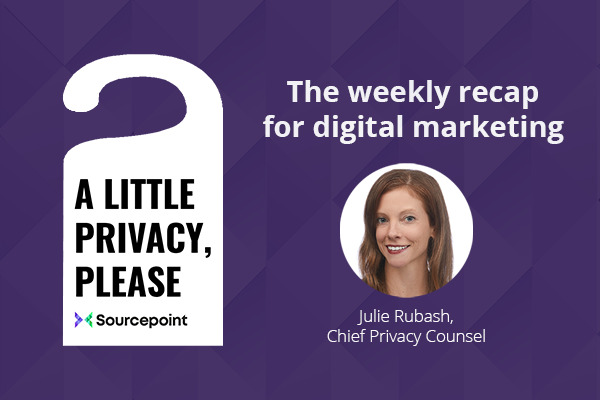Blog
Meta settles with DOJ in housing ads discrimination case
June 27, 2022

Want to receive these weekly privacy recaps in your inbox? Sign up for our privacy newsletter, A Little Privacy, Please.
USA
Meta settles with DOJ re Algorithmic Discrimination
The U.S. Department of Justice announced a $115,054 settlement with Facebook’s parent company, Meta, over allegations that Facebook’s advertising tool enabled advertisers to use user characteristics such as race, color, religion, sex, disability, familial status and national origin, to target housing ads, in violation of the Fair Housing Act.
In addition to paying the settlement, Meta will be required to develop a new system for housing ads to address discriminatory disparaties introduced by Facebook’s current algorithm.
WHY IT MATTERS
The Justice Department noted in its announcement that it is “committed to holding Meta and other technology companies accountable when they abuse algorithms in ways that unlawfully harm marginalized communities” and that “companies like Meta have a responsibility to ensure their algorithmic tools are not used in a discriminatory manner”, making clear that a duty to abide by fair housing laws extends beyond housing providers.
Federal Legislation Takes Several Steps Forward
HR 8152, the bill implementing the American Data Privacy and Protection Act, was formally introduced in the House, referred to the House Committee on Energy and Commerce, referred to a Subcommittee on Consumer Protection and Commerce, considered by the subcommittee in a mark-up session, and forwarded by the Subcommittee to the Full Committee by unanimous voice vote, all within three days.
WHY IT MATTERS
The most recent version of the bill would require affirmative express consent for the collection, processing, or transfer of an individual’s aggregated internet search or browsing history, with certain exceptions such as to protect against security incidents or fraud.
This requirement would shift targeted advertising based on search or browsing history to an “opt-in” consent requirement, rather than the current “opt out” requirement seen in several state laws.
The current version of the bill would preempt state law. The Network Advertising Initiative (NAI) released a statement applauding the efforts toward a “uniform national standard” but noting its desire not to create “a framework that relies too heavily on consumer controls and micromanaging data flows between businesses.
U.S. Senators Press Mental Health Apps re Sharing Data with BigTech
Senators Warren, Booker and Wyden sent letters to mental health apps BetterHelp and TalkSpace to inquire about the type and breadth of data they share with third parties like Google and Facebook, methods they use to protect such data, and processes to inform users about the risks of such data sharing.
The inquiry was based on an investigation showing that enough analytics were shared with Facebook by such apps to give Facebook a sense of when, for how long, and where users were using mental health services, and that, based on certain research, even anonymized information may allow third parties to target such individuals through advertising and “exploit people who are already at a vulnerable point”.
WHY IT MATTERS
A U.S. Senate subcommittee held a hearing on tech privacy protection in December 2021, in which they heard testimony highlighting that persistent, precise location information over time, even if anonymized, pseudonymized, or de-identified, is very straightforward to relate back to individuals.
Such testimony included recommendations for strict control or outright bans on the sale of data in sensitive categories (including inferences).
Senators Warren and Wyden both sit on that subcommittee, so information learned in the tech privacy protection hearing may have contributed to the investigations of data sharing by mental health apps, even if anonymized.
CANADA
Dufresne Appointed as Canada’s Privacy Commissioner
Canada Prime Minister Justin Trudeau officially appointed Philippe Dufresne as Canada’s new Privacy Commissioner starting Monday, June 27. Dufresne will replace Daniel Therrien, whose 7-year term recently expired.
WHY IT MATTERS
Dufresne is taking this position in an interesting time for Canadian privacy.
Three pieces of privacy legislation were recently introduced in Canada, one aspect of which would expand the Privacy Commissioner’s enforcement powers.
According to the legislation, the Privacy Commissioner would be allowed to issue orders to ensure organizations comply with Canadian privacy law and recommend financial penalties of up to the higher of $10 million and 3 percent of the organization’s gross global revenue for non-compliance or, in the case of certain serious offenses, up to the higher of $25 million and 5 percent of the organization’s gross global revenue.
The Commissioner would also have the ability to approve and certify codes of practice and certification programs.
Want more of the privacy highlights that matter to adtech and martech? Sign up for our privacy newsletter, A Little Privacy, Please.
A Little Privacy, Please weekly recaps are provided for general, informational purposes only, do not constitute legal advice, and should not be relied upon for legal decision-making. Please consult an attorney to determine how legal updates may impact you or your business.
Latest Blog Posts
A new chapter: Sourcepoint is joining Didomi to build the future of privacy technology
July 8, 2025Sourcepoint is joining Didomi, a global leader in data...
CCPA Settlement, UCPA Case, and International Compliance Trends
July 7, 2025California AG settles $1.55M CCPA case with Healthline Media...
Tennessee’s TIPA Takes Effect, Teledoc Must Face Wiretapping Claims, Plus Global Privacy Updates
June 30, 2025Tennessee Information Protection Act (TIPA) takes effect July 2025...
Latest White Papers
Connecting Legal & Marketing Teams on Consent and Preferences
February 4, 2025Break down data silos and unlock better collaboration. Marketing...
Navigating Sensitive Data in the U.S.
February 4, 2025Download our comprehensive guide to learn how different states...
Enterprise Guide To Cookie management & Tracker List Curation
July 1, 2024How to review the tracking tech on your websites...
Keep in touch
Sign up for our newsletter to keep up with privacy news for adtech and martech,
plus occasional company news.
